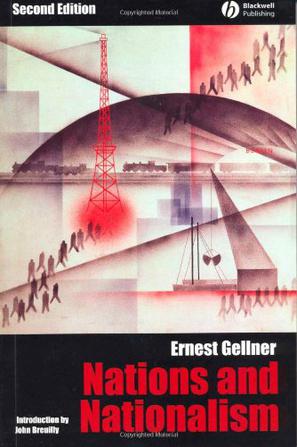Nations and Nationalism
Ernest Gellner
Nationalism is one of the most powerful forces in the modern world, yet it is surprisingly little studied and only imperfectly understood, either by its adherents or its opponents. Its irruption into the modern world is often explained as a resurgence of primitive, atavistic instincts, or as a delusion fostered by a few theoreticians, politicians or propagandists.
The present volume interprets nationalism in terms of its social roots, which it locates in industrial social organization. A society that aims for affluence and economic growth, Professor Gellner argues, depends on innovation, occupational mobility, mass media, universal literacy, and education in a shared, standard idiom. Taken together these transform the relationship between culture and the state. The functioning of the society depends on an all-embracing educational system, tied to one culture and protected by a state identified with that culture. The principle one state, one culture makes itself felt, and political units which do not conform to it feel the strain in the form of nationalist activity. --This text refers to an out of print or unavailable edition of this title.
Table of Contents
About the Authors vii
About this Edition viii
Editor's Preface to the First Edition R. I. Moore, Founding Editor ix
Acknowledgements for the First Edition xi
Introduction John Breuilly xiii
1 Definitions 1
State and Nation 3
The Nation 5
2 Culture in Agrarian Society 8
Power and Culture in the Agro-literate Polity 9
Culture 11
The State in Agrarian Society 13
The Varieties of Agrarian Rulers 14
3 Industrial Society 19
The Society of Perpetual Growth 23
Social Genetics 29
The Age of Universal High Culture 34
4 The Transition to an Age of Nationalism 38
A Note on the Weakness of Nationalism 42
Wild and Garden Cultures 48
5 What is a Nation? 52
The Course of True Nationalism Never did Run Smooth 57
6 Social Entropy and Equality in Industrial Society 62
Obstacles to Entropy 63
Fissures and Barriers 72
A Diversity of Focus 73
7 A Typology of Nationalisms 85
The Varieties of Nationalist Experience 94
Diaspora Nationalism 98
8 The Future of Nationalism 106
Industrial Culture - One or Many? 110
9 Nationalism and Ideology 118
Who is for Nuremberg? 125
One Nation, One State 128
10 Conclusion 131
What is not being Said 131
Summary 133





